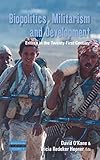Biopolitics, Militarism, and Development : Eritrea in the Twenty-First Century / ed. by Tricia Redeker Hepner, David O'Kane.
Material type: TextSeries: Dislocations ; 6Publisher: New York ; Oxford : Berghahn Books, [2009]Copyright date: ©2009Description: 1 online resource (236 p.)Content type:
TextSeries: Dislocations ; 6Publisher: New York ; Oxford : Berghahn Books, [2009]Copyright date: ©2009Description: 1 online resource (236 p.)Content type: - 9781845455675
- 9781845458980
- 963.507/2 22/eng
- JQ3583.A58
- online - DeGruyter
| Item type | Current library | Call number | URL | Status | Notes | Barcode | |
|---|---|---|---|---|---|---|---|
 eBook
eBook
|
Biblioteca "Angelicum" Pont. Univ. S.Tommaso d'Aquino Nuvola online | online - DeGruyter (Browse shelf(Opens below)) | Online access | Not for loan (Accesso limitato) | Accesso per gli utenti autorizzati / Access for authorized users | (dgr)9781845458980 |
Frontmatter -- CONTENTS -- ABBREVIATIONS -- INTRODUCTION Biopolitics, Militarism, and Development in Contemporary Eritrea -- Chapter One — PITFALLS OF NATIONALISM IN ERITREA -- Chapter Two — WAR, SPATIOTEMPORAL PERCEPTION, AND THE NATION Fighters and Farmers in the Highlands -- Chapter Three — THE YOUTH HAS GONE FROM OUR SOIL Place and Politics in Refugee Resettlement and Agrarian Development -- Chapter Four — HUMAN RESOURCE DEVELOPMENT AND THE STATE Higher Education in Postrevolutionary Eritrea -- Chapter Five — AVOIDING WASTAGE BY MAKING SOLDIERS Technologies of the State and the Imagination of the Educated Nation -- Chapter Six — TRAPPED IN ADOLESCENCE The Postwar Urban Generation -- Chapter Seven — SEEKING ASYLUM IN A TRANSNATIONAL SOCIAL FIELD New Refugees and Struggles for Autonomy and Human Rights -- Chapter Eight — THE ERITREAN STATE IN COMPARATIVE PERSPECTIVE -- CONCLUSION Biopolitics and Dilemmas of Development in Eritrea and Elsewhere -- LIST OF CONTRIBUTORS -- BIBLIOGRAPHY -- INDEX
restricted access online access with authorization star
http://purl.org/coar/access_right/c_16ec
Bringing together original, contemporary ethnographic research on the Northeast African state of Eritrea, this book shows how biopolitics - the state-led deployment of disciplinary technologies on individuals and population groups - is assuming particular forms in the twenty-first century. Once hailed as the “African country that works,” Eritrea’s apparently successful post-independence development has since lapsed into economic crisis and severe human rights violations. This is due not only to the border war with Ethiopia that began in 1998, but is also the result of discernible tendencies in the “high modernist” style of social mobilization for development first adopted by the Eritrean government during the liberation struggle (1961–1991) and later carried into the post-independence era. The contributions to this volume reveal and interpret the links between development and developmentalist ideologies, intensifying militarism, and the controlling and disciplining of human lives and bodies by state institutions, policies, and discourses. Also assessed are the multiple consequences of these policies for the Eritrean people and the ways in which such policies are resisted or subverted. This insightful, comparative volume places the Eritrean case in a broader global and transnational context.
Mode of access: Internet via World Wide Web.
In English.
Description based on online resource; title from PDF title page (publisher's Web site, viewed 25. Jun 2024)


